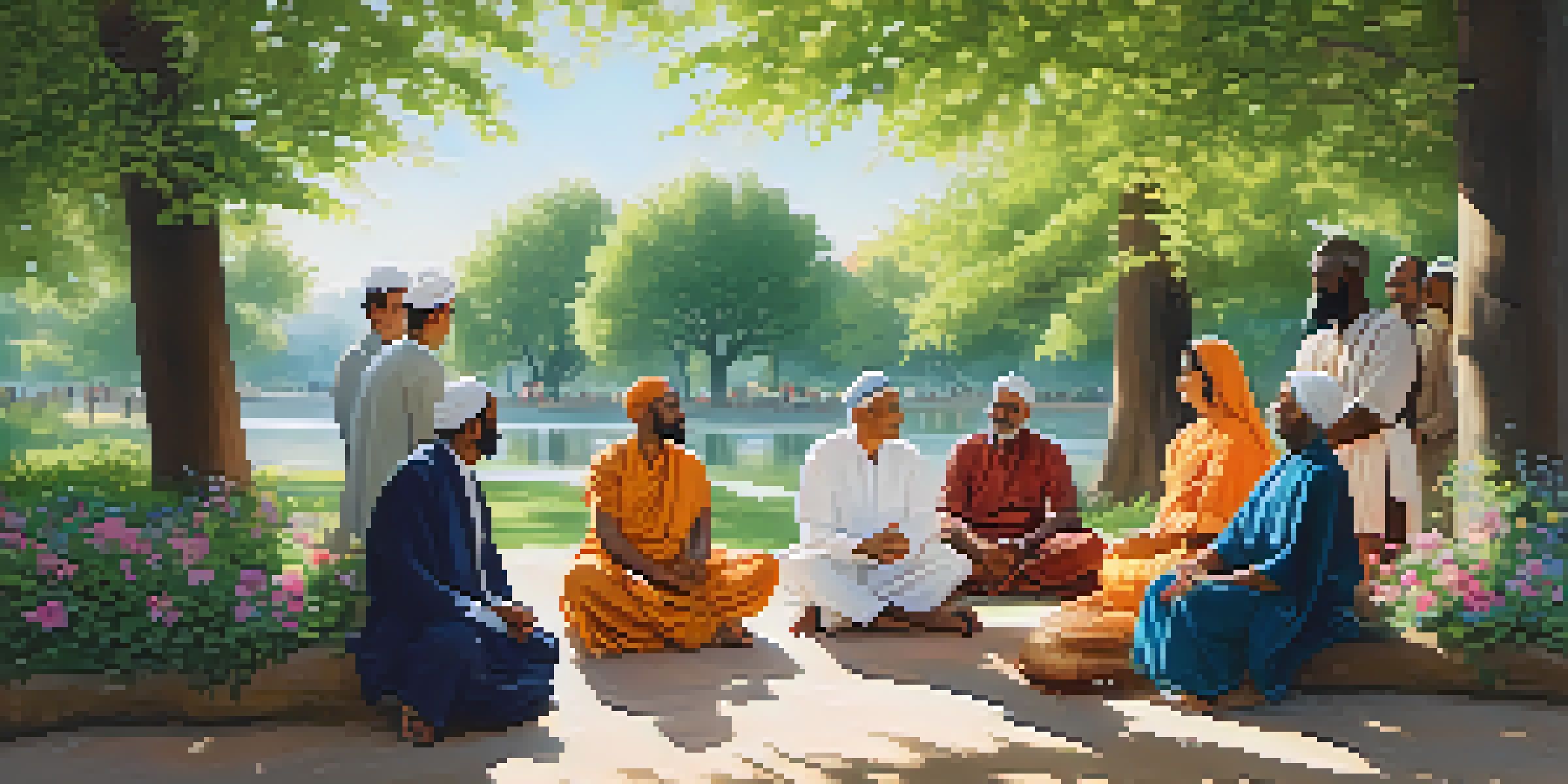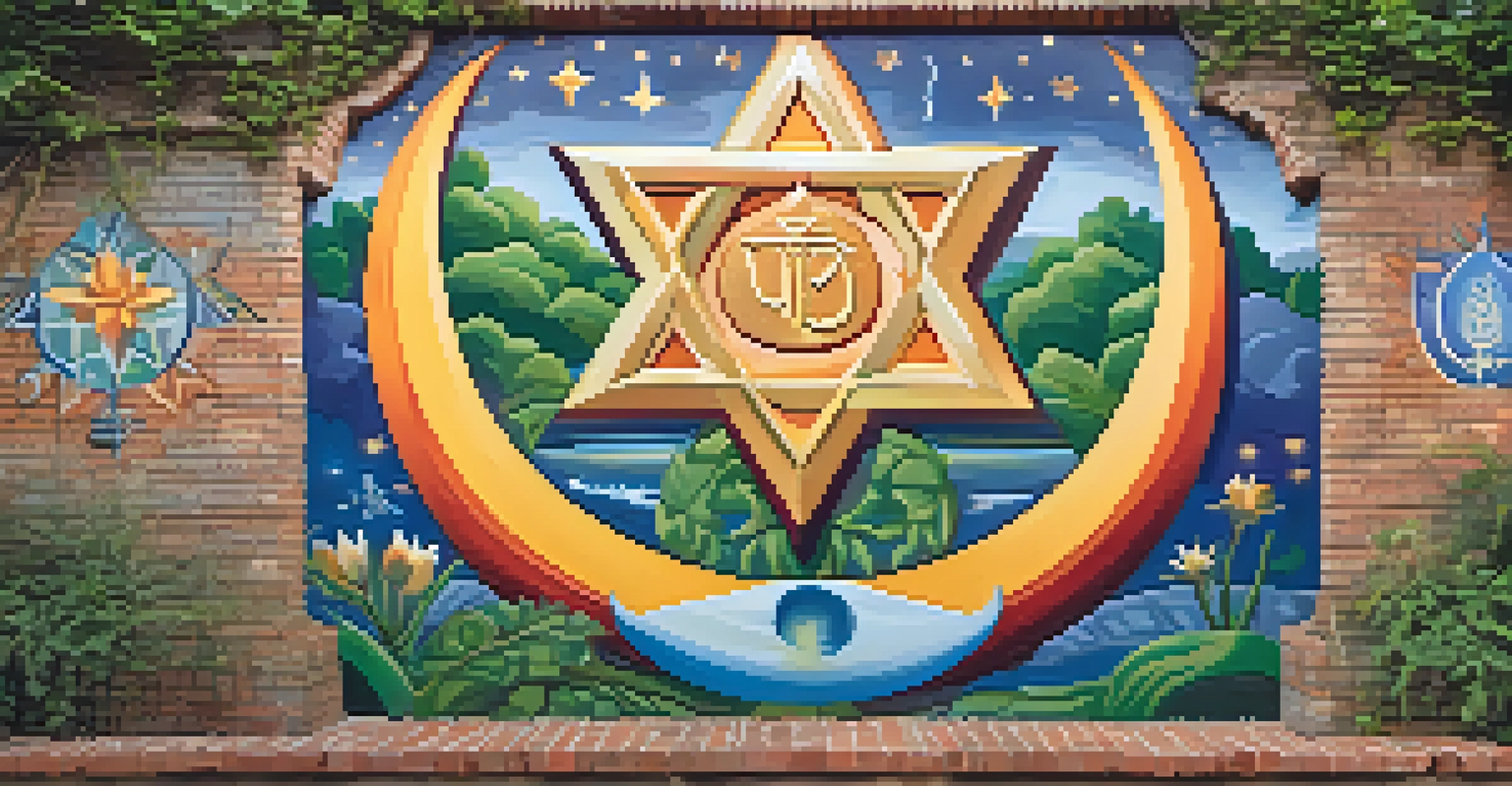Exploring the Role of Interfaith Dialogue in Modern Society

Understanding Interfaith Dialogue and Its Importance
Interfaith dialogue refers to the open and respectful exchange of ideas between different religious traditions. In an increasingly diverse world, this type of conversation becomes crucial for fostering mutual understanding. It allows individuals from various faith backgrounds to share their beliefs and values, paving the way for empathy and cooperation.
Peace is not merely the absence of war. It is also a state of mind.
In modern society, where religious differences can lead to conflict, interfaith dialogue serves as a bridge to overcome misunderstandings. By talking openly, individuals can dispel myths and stereotypes that often fuel division. This dialogue is not just about tolerating differences, but about appreciating the richness those differences bring to our communities.
Moreover, interfaith dialogue can create a supportive environment for collective action. When various faith groups come together to address social issues, they can leverage their unique perspectives and resources. This collaboration can lead to impactful initiatives that benefit society as a whole.
Historical Context of Interfaith Dialogue
The roots of interfaith dialogue can be traced back to ancient times when different cultures and religions interacted through trade and conquest. Throughout history, figures like Gandhi and Martin Luther King Jr. have exemplified the power of interfaith collaboration in promoting peace. Their efforts highlight how dialogue can lead to social change and justice.

In the 20th century, the establishment of organizations dedicated to interfaith dialogue marked a significant shift. Events like the Parliament of the World's Religions began to bring together diverse faith leaders to discuss global challenges. This historical context underscores the growing recognition of the need for dialogue in a pluralistic society.
Interfaith Dialogue Promotes Unity
Engaging in respectful conversations between different faiths fosters understanding and cooperation, essential for building empathetic communities.
Today, interfaith dialogue has evolved to include not only religious leaders but also laypeople, promoting grassroots movements for peace. By understanding our shared humanity, we can build connections that transcend religious boundaries. This evolution reflects a broader awareness of the interconnectedness of our global community.
The Role of Interfaith Dialogue in Conflict Resolution
Interfaith dialogue plays a critical role in addressing and resolving conflicts rooted in religious differences. By creating a platform for discussion, it allows conflicting parties to express their grievances in a safe space. This process fosters understanding, reducing the likelihood of escalation into violence.
Injustice anywhere is a threat to justice everywhere.
A notable example of this can be seen in regions like the Middle East, where interfaith initiatives have led to peacebuilding efforts. Religious leaders often act as mediators, using their influence to advocate for non-violent solutions. Such dialogues can transform adversarial relationships into collaborative partnerships, emphasizing shared goals.
Furthermore, interfaith dialogue encourages communities to focus on common values rather than differences. By highlighting shared beliefs like compassion and justice, it creates a sense of unity. This shift in perspective can significantly aid in healing communities torn apart by conflict.
Interfaith Dialogue and Social Justice
Social justice is a core aspect of many religious teachings, and interfaith dialogue often brings these teachings to the forefront. When people of different faiths unite for social justice causes, they amplify their voices and impact. This collective effort can address issues like poverty, discrimination, and environmental concerns more effectively.
For instance, various faith-based organizations have come together to advocate for climate justice, recognizing that this issue affects everyone. By pooling resources and knowledge, they can promote sustainable practices that honor both the Earth and their spiritual beliefs. This collaboration showcases the power of interfaith dialogue in addressing pressing global issues.
Historical Roots of Interfaith Efforts
Interfaith dialogue has evolved from ancient interactions to modern grassroots movements, highlighting the need for collaboration in a diverse society.
Additionally, interfaith dialogue can challenge social injustices by fostering solidarity among diverse communities. When individuals recognize their shared struggles, they are more likely to work together for change. This unity can lead to powerful movements that challenge the status quo and advocate for a more equitable society.
Building Empathy Through Interfaith Dialogue
Empathy is a cornerstone of effective interfaith dialogue. By listening to and understanding the experiences of others, individuals can develop a deeper appreciation for diverse perspectives. This empathetic engagement is vital in breaking down barriers and fostering meaningful connections.
Engaging in interfaith dialogue allows participants to step into each other's shoes, often leading to transformative experiences. For example, storytelling can be a powerful tool in these discussions, as sharing personal narratives humanizes abstract beliefs. This approach encourages participants to see beyond their own experiences and embrace a broader worldview.
Furthermore, empathy cultivated through interfaith dialogue can extend beyond individual interactions. As more people engage in these conversations, it can create a ripple effect within communities. This growing culture of empathy can lead to more inclusive societies where diversity is celebrated rather than feared.
Challenges Facing Interfaith Dialogue Today
Despite its benefits, interfaith dialogue faces several challenges in modern society. One major issue is the rise of polarization, where individuals increasingly align with their own beliefs and dismiss others. This can create an environment where dialogue feels threatening rather than inviting.
Additionally, misinformation and stereotypes about different religions can hinder productive conversations. When people approach interfaith dialogue with preconceived notions, it can lead to misunderstandings and conflict. Overcoming these barriers requires a commitment to education and open-mindedness.
Challenges of Modern Dialogue
Despite its benefits, interfaith dialogue faces challenges like polarization and misinformation, necessitating a commitment to education and inclusivity.
Lastly, the lack of representation in dialogue initiatives can also pose a challenge. If certain voices are excluded, the conversations may not reflect the diversity of experiences within a community. Ensuring that all voices are heard is essential for meaningful interfaith dialogue and its potential for fostering lasting change.
The Future of Interfaith Dialogue in a Globalized World
As our world becomes increasingly interconnected, the role of interfaith dialogue is more crucial than ever. With globalization, individuals from varied backgrounds interact more frequently, creating both opportunities and challenges. Embracing interfaith dialogue can help navigate these complexities and promote harmony.
Looking ahead, technology may play a significant role in facilitating interfaith conversations. Online platforms can connect people across borders, allowing for dialogue that transcends geographical limitations. This accessibility can foster a sense of global community and shared responsibility.

Ultimately, the future of interfaith dialogue lies in our willingness to engage with one another. By prioritizing understanding and respect, we can build a more inclusive world where diverse faiths coexist peacefully. This vision of collaboration and empathy is not just desirable; it's essential for our collective future.